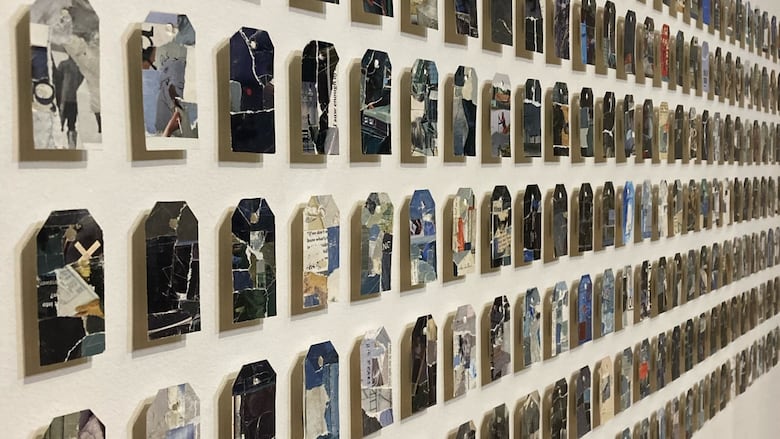Why this self-taught artist started using shipping tags to make her collages
When Seema Shah found herself bedridden, shipping tags became a surprise creative outlet

For Seema Shah, a self-taught visual artist and writer based in Vancouver, art became a lifeline when a chronic mental illness left her bedridden and unable to write in 2013. In search of a creative outlet she could manage from bed, she turned to collage, a practice that soon evolved into a deeply personal form of expression. Her art helps her process and express experiences with trauma, healing and memory — offering a personal way to make sense of her mental health journey.
This journey led her to discover her voice as an artist. She has lived with complex post-traumatic stress disorder (C-PTSD) since childhood. This condition, caused by prolonged trauma — particularly early in life — can lead to a variety of symptoms, including flashbacks, nightmares, various physical symptoms, and difficulty in emotional regulation and forming connections with people.
Writing became crucial during particularly difficult periods, allowing her to process overwhelming emotions through journaling, which gradually evolved into creative nonfiction. For years, writing was her primary outlet, until chronic fatigue syndrome — another condition closely linked to C-PTSD — made it too physically exhausting to continue. That shift ultimately led her to visual art, where she found new ways to express the inexpressible.
In 2014, Shah began a daily creative practice using shipping tags. The small, accessible format of the tags allowed her to create from bed, removing pressure and inviting daily experimentation.

Originally intending to write a few words or sentences on each tag, she soon found herself layering collage and text instead, tapping into a subconscious visual language that helped her process her inner world. The project, which she sustained for a full year, marked the beginning of her work in visual art. A decade later, she returned to the practice with renewed focus, committing to create a full collage every day in 2024.
"I wanted to get back to creating just for the sake of creating, not 'for' something," she says. "But as the weeks went by, I started to see a story that these tiny works were telling — not just individually, but collectively."
In her new project, a show called Missing Pieces, Seema Shah partnered with curator and gallery director Yuri Arajs. The exhibition is presented at Vancouver's Outsiders and Others gallery, where Arajs also serves as Shah's visual arts mentor. For the same project, novelist Betsy Warland has been her writing mentor. Over the past three years, the program has offered free one-on-one mentoring, workshops, exhibitions and publishing opportunities to its participants.

The exhibition features 366 miniature collages — one created each day of 2024 — on shipping tags measuring just 7 by 3.5 centimetres. Together, they reveal the persistence of long-term trauma and the creative resilience that arises from it. Larger collages on vintage book covers and envelopes expand on these theme.
Arajs explains that Shah's exhibition offers the unique perspective of someone living with a chronic illness. He hopes visitors will appreciate the depth and breadth of her work, which includes more than 500 original pieces of artwork
"It's an opportunity for the public to see artwork made through a very specific lens — one you don't often encounter," he says. "I've always believed in giving a platform to voices that typically don't get heard, especially when they are self-taught artists."
In 2025, Outsiders and Others presented a group exhibition as part of its ongoing commitment to working with — and elevating — artists who have lived experience with mental health issues and homelessness. The gallery also hosts exhibitions each year to mark Mental Health Awareness Month in May and International Day of Persons with Disabilities in December.
Shah describes the gallery as a safe and welcoming space for herself and for other artists who may not have other platforms to share their work.

"It's positively impacted the artistic paths of many underrepresented artists, including me," she says. "They're doing truly important work in the community."
Shah hopes her exhibition challenges common assumptions about how personal trauma is expressed. Rather than being loud or overt, her work invites viewers in through quiet, layered reflection.
"The installation aims to offer both an intellectual and emotional sense of the subtle, long-term effects of C-PTSD," she says. "It also raises awareness about how C-PTSD differs from PTSD. I hope this helps deepen understanding and reduce the stigma attached to the condition."
Shah sees her writing and visual art practices as intertwined ways of processing trauma.
"My creative process taps into subconscious and embodied 'knowing' — where fragmented, traumatic memories often live," she explains. "The metaphors and symbolic imagery in my art help translate what's beyond words or conscious awareness, capturing a felt sense and linking past with present."
Seema Shah's Missing Pieces exhibition is on view at Outsiders and Others gallery (100–938 Howe St.) in Vancouver through Aug. 30.